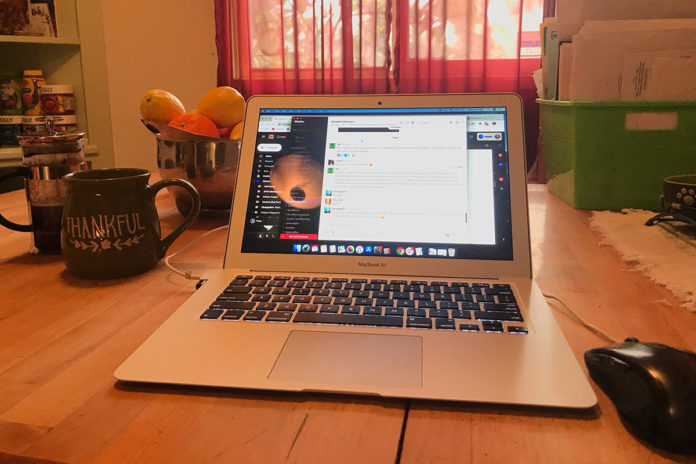
News of closures, shutdowns and restrictions is moving fast. But one thing is certain – technology is playing a huge part in keeping companies connected to their customers and prospects.
As of press time, Gov. Jay Inslee has ordered all public schools to be closed through April 24, and restaurants and bars to close, except for take-out service, as well as entertainment and recreational facilities. Pharmacies and grocery stores are still open, and retailers are subject to clear and transparent social distancing and crowd restrictions. Business owners, managers and staff are scrambling to get fully functional online.
The events industry is one of the hardest hit by so-called social distancing. Across the nation, those who work trade shows, concerts and conferences are losing huge contracts. A week ago, it was estimated that losses in the tech industry due to conference shutdowns exceeded $1 billion. But Brad Wager, owner of Vancouver-based event services production company Wager Audio, offers customers exactly what they need the most now – connectivity. Wager wrote, “The many community and business event cancellations we’re seeing now are difficult to deal with. We are leveraging our existing equipment and expertise around virtual meetings and live web streaming services to get creative, expand options and support business continuity and momentum for folks.”
The company has a page on its website devoted to virtual meetings and streaming services. At the time that he weighed in, his team was streaming a music performance.
Webfor, a Vancouver-based digital marketing and creative agency, is stepping further into its own culture. Employees, most of whom already worked remotely on Tuesdays and Thursday, are now working remotely 100% of the time. Also, flexible hours have been offered to staff with small children at home, or who are sharing workspaces with spouses and other family members.
Director of Accounts Tricia Davis-Payne said Webfor has been strategizing for weeks on the best ways to support employees as well as clients.
“Businesses are going to experience extreme hardship and we are not only asking ourselves how do we help them survive this time, but how do we help them thrive,” she said.
Customers have been trending upwards in E-commerce for years, but Webfor is helping them decide what to offer and when, and most important to communicate that information to their customers. For example, one client who operates escape rooms in Vancouver and Portland is now offering gift cards at a discount for the future as well as private spaces for family gatherings. A travel agency client that focuses on cruise bookings, is taking advantage of deep discounts cruise lines are offering for future bookings.
Davis-Payne said the company’s most valuable resource is CEO Kevin Getch’s time and counsel. And he has cleared his schedule for six to eight weeks to make consultations available and free to current clients. He has also blocked out two free openings per week for non-clients.
“We have a huge client list, and each has a unique situation related to this,” said Davis-Payne. “I’m really proud of Webfor being proactive and compassionate. It’s really easy to think about yourself, but Webfor has stepped up to the plate well before all this news hit our doorstep.”
Because of the increasing remote-based workplace culture, many national companies already have the infrastructure in place – and the local economy benefits.
Stevi Green is the national sales manager for Lillie’s Q, a Consumer-Packaged Goods (CPG) company specializing in regional barbecue sauces and rubs and Southern-inspired kettle-cooked chips. She manages all of the company’s U.S. retail sales.
Green, a wife and mother of four kids based in the Hough neighborhood of downtown Vancouver, is a veteran remote employee.
“I’ve worked from home for just over seven years now for three different companies based in Springfield, Ore., Minneapolis, Minn., and now currently for a company based in Chicago, Ill.,” she wrote in an email. “Technology has always played a huge role in my day-to-day activities. There are so many great platforms for a remote team to use to collaborate and share information. Zoom, Asana, Basecamp, Dropbox Business, etc. make all of this possible.”
But, while all technology makes her work possible, the in-person connection tends to persuade new customers. In ordinary times, she would be traveling extensively.
“Face-to-face meetings are also a huge part of my job function as I meet with buyers to demonstrate our products and that personal connection definitely gets lost over a screen. I assume this could change over time if it became the new norm, but for now, companies like mine are relying heavily on data and other factors to secure new business,” she wrote. “However, for small emerging brands this presents a huge challenge.”
Since the digital infrastructure is already in place, Green assumes it will be better utilized, but possibly not to increased results. “I think more people will hold video conference meetings, but I don’t think they will be as effective as in person.”
Her challenge is also a deeply personal one that many working parents face, saying, “The biggest challenge will be that I can’t just pop over to a coffee shop to have some quiet to focus, which will be hard since the whole family is here all day.”
Some companies are taking an aggressively proactive approach.
Maureen Winningham is director of Learning and Development at Boston-based Public Consulting Group. She lives in Vancouver.
She said, in a comment on a Facebook query from the Vancouver Business Journal, “My employer has eliminated all non-essential business travel, eliminated international travel, is encouraging everyone to work remotely and giving unlimited paid time off – separate from vacation that is untouched. And I am converting $260,000 work of instructor-led training to multiple modality virtual learning experiences. It is a great time to be innovative and agile!”







